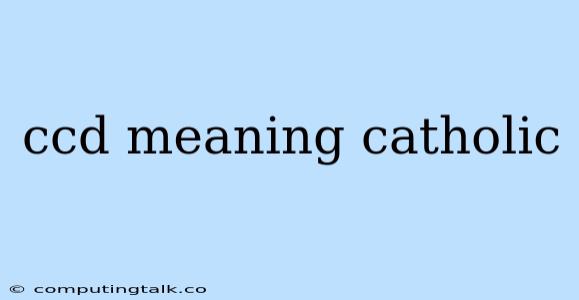The term "CCD" in the context of Catholicism refers to the Catholic Church's Code of Canon Law. This code is a comprehensive set of laws governing the Catholic Church and its members, including its structure, organization, and doctrines. It encompasses various aspects of Catholic life, from the sacraments to the roles of clergy and laity.
What is the Catholic Church's Code of Canon Law?
The Code of Canon Law serves as the official legal framework for the Catholic Church. It outlines the principles, rules, and regulations that guide the Church's operations and the lives of its members. The code addresses a wide range of subjects, including:
- The sacraments: The seven sacraments of the Catholic Church are explained in detail, including their meaning, validity, and administration.
- Clergy: The code defines the roles, duties, and responsibilities of priests, bishops, and other ordained ministers.
- Laity: It also outlines the rights and obligations of lay Catholics, including their participation in the Church's mission and governance.
- Church structure: The Code of Canon Law defines the hierarchical structure of the Church, from the local parish level to the universal Church.
- Church property: It addresses matters related to the ownership and administration of Church property, as well as the rights and responsibilities associated with it.
- Marriage and family life: The code outlines the Church's teachings on marriage, divorce, and the family, including the sacrament of Matrimony.
- Moral conduct: The code also covers matters related to moral conduct, including the Ten Commandments, the Beatitudes, and other moral teachings of the Catholic Church.
Why is the Code of Canon Law Important?
The Code of Canon Law is essential for several reasons:
- Guidance and stability: It provides a framework for guiding the Church's operations, ensuring consistency and stability across its various structures and institutions.
- Clarity and consistency: The code helps to clarify the Church's teachings and ensure consistency in their application.
- Protection of rights: The Code of Canon Law protects the rights of both clergy and laity within the Church, ensuring fairness and justice in all matters.
- Resolution of disputes: The code provides a framework for resolving disputes and disagreements that may arise within the Church, ensuring a fair and impartial process.
History of the Code of Canon Law
The Code of Canon Law has a long history, evolving over centuries to reflect the needs and challenges of the Church. The current Code, known as the Code of Canon Law of 1983, was promulgated by Pope John Paul II and replaced the previous code, which had been in effect since 1917.
Key Features of the Code of Canon Law
The Code of Canon Law of 1983 has several key features:
- Comprehensive scope: It covers a vast range of topics related to the Catholic Church's structure, organization, and teachings.
- Clarity and conciseness: The code is written in a clear and concise style, making it relatively easy to understand.
- Universal application: The code applies to all Catholic Churches worldwide, ensuring consistency in the Church's laws and regulations.
- Emphasis on the lay faithful: The Code of Canon Law recognizes the important role of lay Catholics in the life of the Church.
- Flexibility and adaptability: The code is designed to be adaptable to changing circumstances and needs, allowing for some flexibility in its application.
Understanding the Code of Canon Law
For Catholics, understanding the Code of Canon Law is important for several reasons:
- Informed participation: Knowledge of the code helps Catholics to participate more fully and effectively in the life of the Church.
- Respect for authority: Understanding the code fosters respect for the Church's authority and its structures.
- Resolution of issues: The code provides a framework for resolving any issues or concerns that Catholics may have within the Church.
- Personal growth: Studying the Code of Canon Law can deepen one's understanding of Catholic teachings and values.
Accessing the Code of Canon Law
The Code of Canon Law can be accessed online and in printed form from various sources, including the Vatican website. There are also resources available that offer explanations and interpretations of the code, making it more accessible to the general public.
Conclusion
The Code of Canon Law is an essential document for understanding the Catholic Church and its teachings. It serves as the legal framework that governs the Church's operations and the lives of its members. By understanding the Code of Canon Law, Catholics can participate more fully in the Church's life, contribute to its mission, and foster a deeper understanding of their faith.
